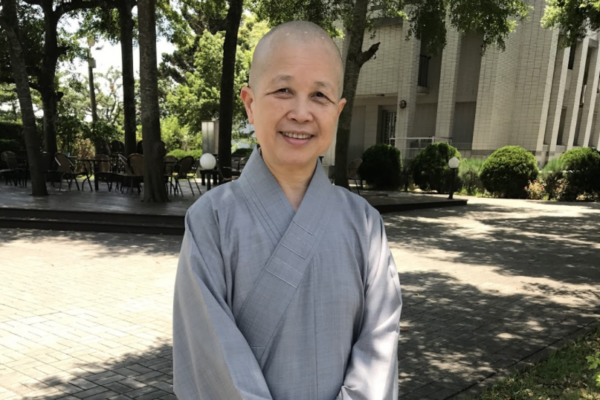This article was originally published in Harvard Divinity Bulletin, with the support of CRCC’s global project on engaged spirituality.
BUDDHIST MASTER THE VENERABLE Chao-hwei Shih beamed at two 30-year-old brides kneeling before her in matching white strapless gowns and rhinestone tiaras as they exchanged prayer beads in her monastery outside Taipei. It was 2012 and gay marriage was still illegal throughout Asia, but Chao-hwei hoped that officiating at Taiwan’s first Buddhist same-sex wedding would garner support in her predominantly Buddhist country. “In Buddhism, desire is not a sin,” said Chao-hwei, her ceremonial yellow robes and red sash draped over her petite frame, her shaved head crowning a heart-shaped face.
Seven years later, in May 2019, thousands celebrated in the streets when Taiwan became the first country in Asia to legalize gay marriage. Gay couples still send the Venerable Chao-hwei Shih notes of gratitude for her early advocacy and mail her boxes of wedding biscuits traditionally sent to honored guests.
Chao-hwei, who will be 63 on May 28, is part of an international group of engaged Buddhists who believe their tradition requires more than an individual quest for enlightenment and who use the insights gained from meditation and Buddhist teaching to lessen the suffering of others. The movement has its roots in early twentieth-century China, when Buddhist humanists began focusing on practices for the living rather than rituals for the dead. Well-known Zen Buddhist Thich Nhat Hanh coined the term “engaged Buddhism” during the Vietnam War. But in a Buddhist world where many still think women should bow to male masters, and even the Dalai Lama has not allowed ordination of non-Western nuns, Chao-hwei is a leading voice for liberation in Asia and beyond.
She does not need warmth, she says, which to her suggests an undue focus on the self.
When she smiles benevolently, Chao-hwei exudes serenity borne of three decades of meditation and chanting. She is known as a gracious host who welcomes Buddhist leaders and budding participants to her monastery of 20 bhiksunis (ordained nuns). At the same time, she is a strict teacher of Buddhist philosophy and does not care much if you like her. She does not need warmth, she says, which to her suggests an undue focus on the self. The Buddhist emphasis on compassion, she believes, has to be balanced with the need for right speech, and she’s become famous in Taiwan for her witty retorts.
In 2017, for example, she took on a man who objected to gay unions. “I feel disgusted when I see two men hugging,” he said at a conference on same-sex marriage in Hong Kong.
“I get disgusted when I see a man and a woman hugging,” she joked, in a video clip that went viral in Taiwan.
A home, she said at a public hearing in Taiwan, is about more than “a union between a sperm and an egg.”
What drew Chao-hwei to monastic life, I wondered, and what led her to combine contemplation with a life of activism? How did she become a staunch advocate for women’s ordination and a leader for the rights of the marginalized in a region where LGBTQ people still face extreme discrimination? I knew about American Buddhist women, such as Zen priest Joan Halifax Roshi, who helped popularize mindfulness in the West. But, in Asia, the most populous continent and where Buddhism first flourished, how was Chao-hwei reimagining her tradition?
I JOINED THE BHIKSUNIS in simple gray robes for 5 AM chanting during my weeklong stay at Buddhist Hong Shi College and monastery, a simple compound of modern brick buildings outside Taipei City that includes dorms for the nuns and students who come to study with Chao-hwei. Roaming the grounds are rescued cats the nuns like to scoop into their arms for impromptu belly rubs.
Their home lacks the elaborate adornments of more traditional monasteries that are filled with carved wood and gilded statues. In the dining hall, an unadorned Buddha sits between two vases of three carefully arranged flowers. The vegan meals prepared by the nuns and community volunteers include appealing arrays of fresh fruit and steamed vegetables in delicate sauces.
Chao-hwei divides her time between the monastery she founded in 1997 and serving as chair of the religion department at Hsuan Chuang University in Hsin-Chu City, where she teaches Buddhist philosophy and ethics with a strong emphasis on animal rights.
Chao-hwei envisioned a community devoid of cliques, one committed to decision-making by consensus and focused on a rigorous program of education in Buddhist philosophy.
Although shorter in stature than the other nuns, she is a commanding presence with perfect posture, a serene observer who delights in the stories the nuns share around the table. Unlike more traditional monastics whose disciples bow before them, Chao-hwei envisioned a community devoid of cliques, one committed to decision-making by consensus and focused on a rigorous program of education in Buddhist philosophy.
I noticed that one woman at the table sat in silence, concentrating on her food, seemingly impervious to her sisters, changing her expression only when tasting a bitter salad. She was Chao-hwei’s younger sister, I learned, who had followed her from convent to convent.
Chao-hwei discovered Buddhism in college, she told me over a pot of oolong tea. Born in China’s Guangdong Province to a landowning family, Chao-hwei’s father, and later her mother, fled to Burma and then to Taiwan when her wealthy uncle committed suicide after he was tortured during the rise of communism. Although they identified as Buddhist, none of her relatives knew Buddhist teachings.
It was not until her sophomore year at National Taiwan Normal University that she attended one of the many summer camps formed to attract students to Mahayana Buddhism. “Buddha’s teachings really moved me. I liked that there was no God I had to obey and there were practical ways of gaining happiness through detachment. My parents were getting old and would face issues of aging and health and I wanted to be ready for that.” Her father objected to her decision to enter a monastery, given that she was his favorite who he hoped would take care of him in his old age. But she thought family commitments would prevent her from immersing herself in Buddhist philosophy.
She loved the early days, when she was the youngest practitioner in a small monastery in New Taipei City, where she learned to cultivate stillness and realize the futility of grasping for things that are constantly changing. Her Buddhist master was a father figure she adored despite his adherence to the Eight Heavy Rules, which said that nuns were subservient and had to bow before monks. “I had no idea about feminism in those days,” she says.
Then her own father died while she was away, leaving her feeling bereft and guilty, and her younger sister, to whom she was devoted, began behaving oddly. “She would be driving and suddenly drift away, and my mother would panic.” Eventually, her sister was diagnosed with schizophrenia and needed help finding medical care. Her master said she had to choose between the monastery and her family.
“Detachment is for the greater good,” he said. Everything was transient, he told her, and her first responsibility was to attain personal enlightenment through meditation.
“But why does that mean being cruel to my family?” she asked. “It’s not only about dharma. It’s also about life. If I desired to be a good bodhisattva, to deliver others from suffering, how could I see my family suffer without helping?”
She agonized about whether to leave her master, now aging and ill. “But in the end I chose my mother and sister.”
She moved with them to a lay community in southern Taiwan, where Chao-hwei continued her studies in Buddhist philosophy and ethics. “It was hard, but my heart was happy.” She found renowned teacher Master Yin Shun, a Buddhist humanist who said she should be concerned about the suffering of all human beings. “He said I should be motivated by empathy and not causing others to suffer because of my actions, thoughts, and speech.”
Male and female practitioners, he told her, could reach enlightenment. And he wrote her a 12-page letter saying she had a rare capacity to understand and teach Buddhist philosophy.
For the next four decades, she brought her sister wherever she went, taking her from doctor to doctor in search of medicine that would silence the voices that tormented her. They settled in the monastery she founded with donations from Buddhist monastics and students. Chao-hwei encouraged her sister to study the Buddhist precepts until, against all odds, she became a bhiksuni in her own right.
“My sister has done beautifully. She still hears voices. She doesn’t say much. But she’s very bullish and studied harder than I did.”
IN THE FIFTH CENTURY, women began to receive full ordination as bhiksunis in a lineage that comes from Sri Lanka. Later, nuns in Korea, Japan, and Vietnam were ordained, and in modern Taiwan nuns in the Mahayana tradition receive ordination and a first-class education in Buddhist philosophy. But in the more conservative Theravada Buddhist tradition, practiced in Sri Lanka, Myanmar, Thailand, and Cambodia, women are still not accepted into monasteries, nor are Tibetan Buddhist nuns.
Women, Chao-hwei said, have been viewed throughout Buddhist history as potential enemies, because of teachers who rely on distorted interpretations of the Buddha’s disciples rather than the teachings of the Buddha.
“There is a deep fear of the female as the defiler, responsible for corrupting men and lacking the intelligence to understand the Buddha dharma,” she said.
The Dalai Lama offered hope for women’s ordination in the Theravada tradition when he visited with Chao-hwei and other nuns in Taiwan in 1997. But later he said Buddhists from all traditions needed to get on board first.
When he returned to Taiwan a second time, in 2001, Chao-hwei decided to gather a group of nuns, monks, and lay practitioners. At an academic conference on humanistic Buddhism in Taipei, in front of television cameras, they ripped up a copy of the Eight Heavy Rules that declare nuns are subservient. Although it was widely believed that the Buddha had implemented the rules when he allowed his aunt to be ordained, Chao-hwei and other feminist Buddhist scholars maintain they are later additions to the canon.
The Dalai Lama’s decision to insist Buddhist male leaders concur on women’s ordination, she told reporters, was “like leaving the destiny of spring chickens in the hands of weasels.”
Critics accused her of using combative language unsuitable for a nun. A group of bhiksunis tried, and failed, to nullify her ordination. But Chao-hwei believes right speech trumps conciliatory language in social movements aimed at liberating people from suffering.
“When you’re engaged in social movements that criticize an ideology or system, it is different from charity work like disaster relief, where you see a clear connection with compassion. But when we have to fight for justice and speak against a regulation, a system, or the person who created that system, it’s not easy to make the immediate connection to compassion. Our speech to them might not be so compassionate because we have to speak critically about an issue.”
Her focus on gay marriage began with the article “Should Homosexuality Really Need to Carry the Yoke of Sin?” that she wrote for the 83rd issue of the Hong Shi bimonthly magazine—one of 75 journal essays and 30 books she has authored. Buddhist teachings say desire, such as a craving for sex that initially attracts partners, is fleeting, she said. Eventually, people in all kinds of love relationships become numb to their partners. This indifference can lead them to seek out other partners, which can cause suffering. Couples, she believes, have to receive familial and government support so they can cultivate long-term relationships based on enduring love and commitment.
How does she know this, as a celibate monastic? I asked. “Desire comes in many forms, including a craving for delicious spicy food that I will eventually become numb to so I need spicier and spicier food. We think there is no problem when one has desire. The problem is attachment to desire that makes people suffer. So, it seems Christianity is more focused on sin. Buddhism puts more focus on suffering.”
When a same-sex couple in their 30s wrote to her on Facebook asking her to preside at their ceremony, unusual in Buddhism, she readily agreed. “How could you be so stingy as to begrudge a couple for wanting to be married regardless of their sexual orientation?” she asked a reporter for the Taipei Times.
The parents of the brides were notably absent at the ceremony, but 200 guests filled the college and joined in chanting sutras for the couple.
“I am certain you will lead a life of happiness together, especially after you have overcome so much difficulty and societal discrimination,” she said. “You have blessings not only from the Buddha, but also from those whom you may or may not know who are in the audience.”
Chao-hwei was delighted by the positive response she received from other LGBTQ couples who sent her biscuits from their weddings.
“Look at the biscuits I just got from these adorable girls,” she posted on Facebook, where she has thousands of followers.
Other monastics supported her, and her teaching position was protected by law. But opponents trolled her on Facebook and inundated her university with calls. “I sometimes write, ‘If that’s what makes you happy, feel free to continue,’” Chao-hwei said. ”But mostly I don’t read the comments. I could worry about losing my reputation and think of how to protect myself. That’s why it’s important to observe the state of our mind and body to retain a tranquil mental attitude. When I participate in a social movement, the Buddhist idea of ‘no self’ applies because I have to put my own well-being second. ‘No self’ does not mean to put yourself lower than anyone else. But if we are wholly motivated to benefit people who are suffering, then we have to let go of ourselves temporarily.”
Craving approval, she said, would only hinder her mission. “If I expect others to support me or give me warmth, it’s still kind of an attachment to myself. Let’s say I have gathered a group of like-minded people from whom I gain support, but I’m afraid to lose them and I don’t stand up and speak the truth in my mind. Then I am still attached to the idea of myself. Let’s say I’m with a man who supports animal rights but not gender equality. Can I speak my mind about gender equality, or would I be afraid of losing his warmth?”
It would be several years before the Taiwan Alliance to Promote Civil Partnership Rights represented an LGBTQ activist in a lawsuit declaring the prohibition against gay marriage unlawful. Taiwan’s Constitutional Court agreed in May 2017, and same-sex marriage became officially legal two years later, on May 24, 2019.
A bhiksuni in yellow robes, Taiwan’s leading news outlets noted, had helped pave the way.
TODAY, CHAO-HWEI IS IN the process of completing a book with the ethicist Peter Singer, excerpts of which have been published in The Harvard Review of Philosophy. “She calls me a bodhisattva,” said Singer, who met Chao-hwei after she wrote an introduction to the Mandarin translation of his book Animal Liberation, and he was drawn to the clarity of her writing on Buddhist ethics. “She should be better known outside Taiwan as a significant teacher of the Buddhist perspective.”
The tenor of their discussion has been “civil and gracious,” he said in a telephone interview. “She is not pushy about people living the way she lives.” Singer and Chao-hwei are both atheists who believe that all sentient beings should be treated equally. Chao-hwei played a key role in Taiwan’s Animal Protection Act of 1998.
They both agree that the use of birth control should be free of ethical controversy. But Singer is for using embryos in research, while Chao-hwei is against it, because she believes embryos have a strong desire to survive and each embryo has the potential to become a Buddha. Chao-hwei believes that such knowledge as whether embryos feel fear can be obtained through a deep meditative practice, while Singer relies on scientific study.
“Dear Respected Peter Singer,” she said, “You may think an embryo cannot feel fear. When we expand and deepen our awareness to mental and physical states of our own or those of others, we will develop a keener observation. We will see that when survival instincts are violated forcefully, a living organism will collapse and decease with intense fear.”
The question of abortion, she told Singer, is more challenging “because it involves the right to life of a baby and his or her mother’s physical autonomy.” In this debate, she takes the Buddhist “middle path” that tries to balance two extremes, and she calls for considering a woman’s personal circumstances. But she does not fully agree with Singer’s controversial assertion that parents should be able to terminate the lives of disabled infants they feel unable to care for.
Chao-hwei stays up late editing the transcripts of their conversations and articles on such topics as gambling, which she has witnessed tear families apart, and the sex scandals involving Buddhist male leaders corrupted by power. In 2018, for example, the head of the Buddhist Association of China was accused of coercing nuns into sex.
“The support they receive becomes like poison. There is a cycle of sex abuse in different traditions in every generation. Some people think we should not expose a scandal. But then the abuse will continue and victims will be crying in the dark.”
She hopes that Taiwan’s legalization of gay marriage will have a ripple effect throughout Asia.
She continues to work for women’s rights, attending international conferences and conducting classes to help propagate a Buddhism that espouses equal rights and access to education for nuns worldwide. She hopes that Taiwan’s legalization of gay marriage will have a ripple effect throughout Asia. A survey in Japan by the advertising company Dentsu found that almost 80 percent of people 60 and under support same-sex marriage. In Hong Kong, a high court judge has ruled that civil servants from Hong Kong who travel overseas to marry their same-sex partners are entitled to claim the same rights and benefits as heterosexual married couples. Still, same-sex marriage is outlawed in at least 20 Asian nations, and Brunei has threatened gays with stoning and amputation.
The bhiksunis continue to support her, and Chao-hwei finds comfort in her sister, who thrives in her own quiet way. But Chao-hwei alone bears the brunt of public criticism.
Is she ever tempted to give up the struggle? I asked over our last pot of tea.
She smiles broadly and sighs.
“It’s easier to deal with physical exhaustion and sleep for two days. If I only wanted tranquility, I would suffer.” Meditation, she says, helps her “cultivate stillness that makes her heart grow. But when I see ugliness in the world, it’s more important to take action.”
People who do not act when they see injustice experience their own kind of torment, she believes. Taking action, she says, “results in a more profound peace in one’s heart.”
Read the article on bulletin.hds.harvard.edu.
Julia Lieblich is a journalist fellow with the Spiritual Exemplars Project.









